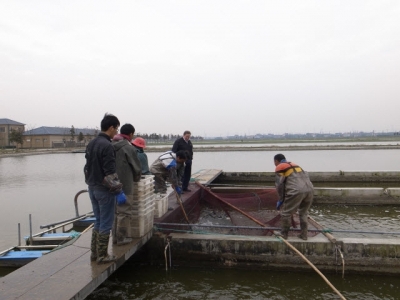USSEC showcases IPA farming technology in China

The U.S. Soybean Export Council (USSEC) demonstrated the Intensive Pond Aquaculture (IPA) system to China’s fish-farming industry, a technology the group says could be widely opted across the country.
Developed at Auburn University with funding from the soy industry, the IPA system aims to significantly increase the yield of fish while limiting environmental impacts. The group released a video showcasing the techonology on Monday.
“The IPA system offers multiple benefits to address environmental and food safety concerns,” said Dr. Jesse Chappell, extension specialist and associate professor of aquaculture development hatcheries management. “By creating a riverine flow in the pond, the fish have a healthy environment, and water quality is protected due to the removal of waste and recycling for other uses, such as biofuel and fertilizer.”
Dr. Michael Cremer, international aquaculture senior program advisor at USSEC, said limited water resources and water quality restrict the growth of China’s aquaculture industry.
“Greater food safety, less environmental impact and up to triple the yields are all reasons why the IPA technology has been enthusiastically endorsed by the Chinese government,” said Cremer. “The biggest benefit is water conservation and being able to recycle and reuse the pond water because the waste has been removed. This system has the potential to revolutionize Chinese aquaculture, and will certainly help them grow to meet increasing demand for high quality fish.”
Có thể bạn quan tâm
 For Great Lakes aquaculture, it’s a tale of two countries
For Great Lakes aquaculture, it’s a tale of two countries Canada and the United States may be neighbors, but when it comes to aquaculture in the Great Lakes – Superior, Huron, Michigan, Ontario and Erie
 Tilapia Fish Farming Information Guide
Tilapia Fish Farming Information Guide Fish is one of the species that is being farmed since centuries. Due to natural resources, fish became the best and cheapest animal protein consumed worldwide
 Ussec introduces intensive pond aquaculture technology to chinese aquaculture inductry
Ussec introduces intensive pond aquaculture technology to chinese aquaculture inductry USSEC recently introduced Intensive Pond Aquaculture (IPA) Technology to the Chinese aquaculture industry.